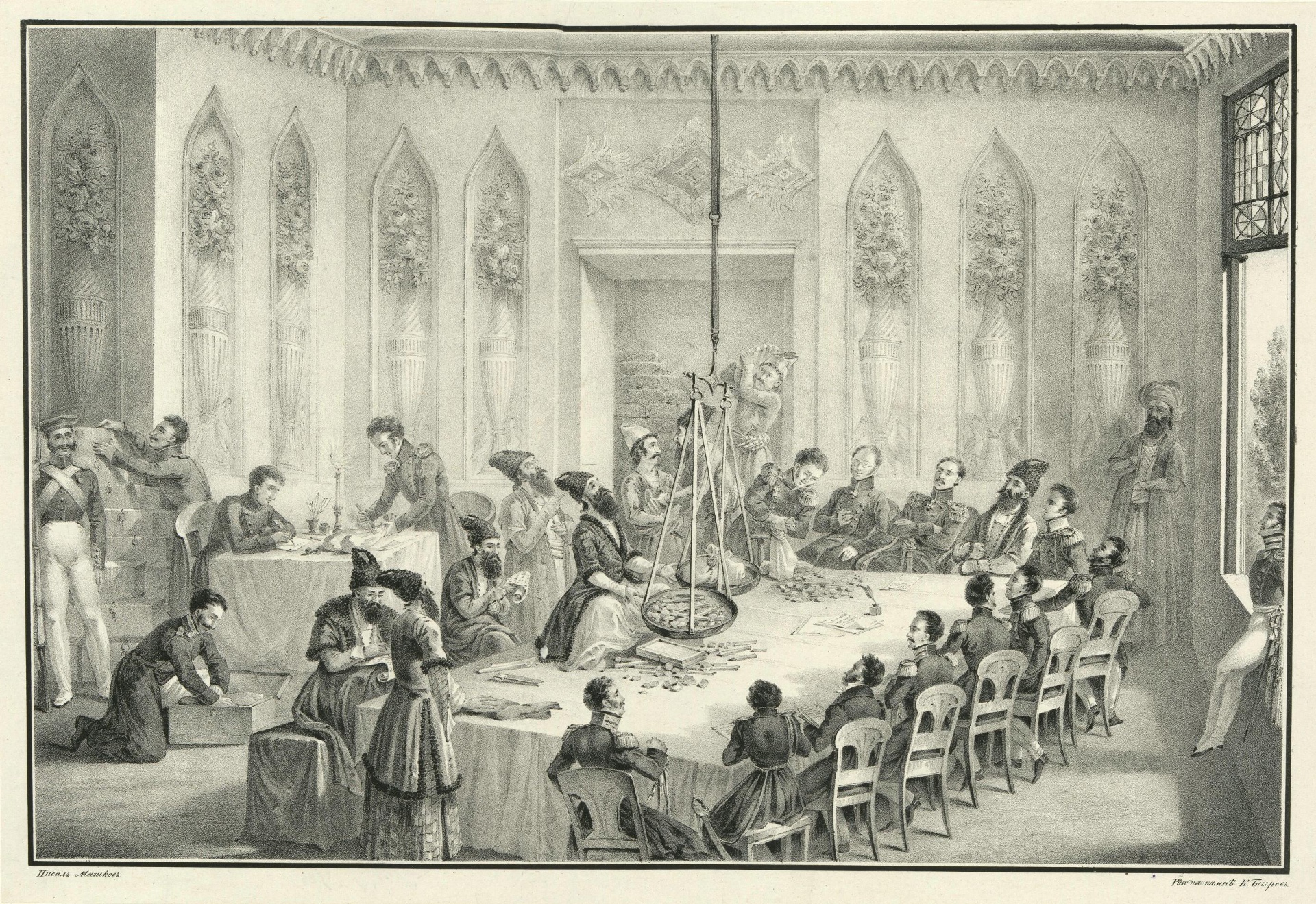|
Massacre At The Russian Embassy In Tehran
Massacre at the Russian Embassy in Tehran, in Russian historiography Tehran Tragedy of 1829 was a mass murder of members of the Russian embassy and the Armenian refugees they sheltered. Subsequently, the Mujahideen killed almost the entire Russian embassy. Among the victims was also the head of the diplomatic mission and part-time famous Russian writer Alexander Griboyedov. Background After the signing of the Treaty of Turkmenchay, Turkmanchay Peace Treaty, a diplomatic mission headed by Alexander Griboyedov was sent to Qajar Iran, Persia in the autumn of 1828. In January 1829, Griboyedov conducted difficult negotiations with the Fath-Ali Shah Qajar in Tehran, during which he demanded from the Persian Shah the payment of the remaining debt, as well as the return of people captured during the Russo-Persian War (1826-1828), war of 1826–1828. During these negotiations, 2 Armenian concubines ran to his temporary residence, and later the second eunuch of the Shah's harem, Yakub, whom ... [...More Info...] [...Related Items...] OR: [Wikipedia] [Google] [Baidu] |
Tehran
Tehran (; , ''Tehrân'') is the capital and largest city of Iran. It is the capital of Tehran province, and the administrative center for Tehran County and its Central District (Tehran County), Central District. With a population of around 9.8 million in the city as of 2025, and 16.8 million in the metropolitan area, Tehran is the List of largest cities of Iran, most populous city in Iran and Western Asia, the Largest metropolitan areas of the Middle East, second-largest metropolitan area in the Middle East after Cairo, and the 24th most populous metropolitan area in the world. Greater Tehran includes several municipalities, including, Karaj, Eslamshahr, Shahriar, Tehran province, Shahriar, Qods, Iran, Qods, Malard, Golestan, Tehran, Golestan, Pakdasht, Qarchak, Nasimshahr, Parand, Pardis, Andisheh and Fardis. In the classical antiquity, part of the territory of present-day Tehran was occupied by Rhages (now Ray, Iran, Ray), a prominent Medes, Median city almost entirely des ... [...More Info...] [...Related Items...] OR: [Wikipedia] [Google] [Baidu] |
Treaty Of Turkmenchay
The Treaty of Turkmenchay (; ) was an agreement between Qajar Iran and the Russian Empire, which concluded the Russo-Persian War (1826–1828). It was second of the series of treaties (the first was the 1813 Treaty of Gulistan and the last, the 1881 Treaty of Akhal) signed between Qajar Iran and Imperial Russia that forced Iran to cede or recognize Russian influence over the territories that formerly were part of Iran. The treaty was signed on 22 February 1828 (5 Sha'ban 1243) in Torkamanchay (a village between Tabriz and Tehran). It made Iran cede the control of several areas in the South Caucasus to Russia: the Erivan Khanate, the Nakhchivan Khanate and the remainder of the Talysh Khanate. The boundary between Russia and Iran was set at the Aras River. These territories are now Armenia, the south of the Republic of Azerbaijan, Nakhchivan and Iğdır Province (now part of Turkey). The treaty was signed for Iran by the Crown Prince Abbas Mirza and Allah-Yar Khan Asef ... [...More Info...] [...Related Items...] OR: [Wikipedia] [Google] [Baidu] |
Solomon Melikov
Solomon (), also called Jedidiah, was the fourth monarch of the Kingdom of Israel and Judah, according to the Hebrew Bible. The successor of his father David, he is described as having been the penultimate ruler of all Twelve Tribes of Israel under an amalgamated Israel and Judah. The hypothesized dates of Solomon's reign are from 970 to 931 BCE. According to the biblical narrative, after Solomon's death, his son and successor Rehoboam adopted harsh policies towards the northern Israelites, who then rejected the reign of the House of David and sought Jeroboam as their king. In the aftermath of Jeroboam's Revolt, the Israelites were split between the Kingdom of Israel in the north (Samaria) and the Kingdom of Judah in the south (Judea); the Bible depicts Rehoboam and the rest of Solomon's patrilineal descendants ruling over independent Judah alone. A Jewish prophet, Solomon is portrayed as wealthy, wise, powerful, and a dedicated follower of Yahweh (God), as attested by the ... [...More Info...] [...Related Items...] OR: [Wikipedia] [Google] [Baidu] |



